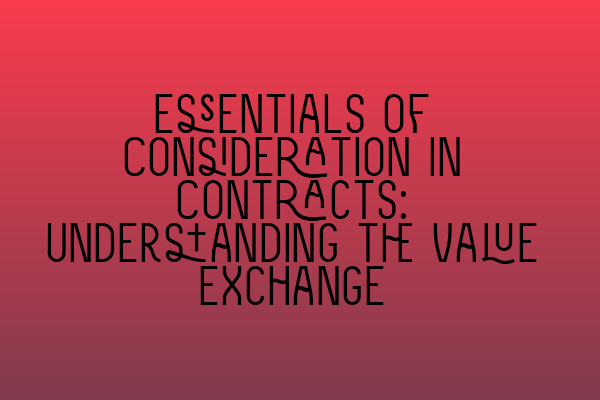Essentials of Consideration in Contracts: Understanding the Value Exchange
When it comes to contract law, one of the fundamental principles is the concept of consideration. Consideration refers to the value that each party brings to the table in a contract. It is a vital element that validates the enforceability of a contract and ensures that both parties are giving and receiving something of value.
In simple terms, consideration is the exchange of promises or the performance of an act that has a legal benefit and detriment to both parties involved. This exchange of value distinguishes a contract from a mere promise and provides the basis for the parties’ legal obligations.
To better understand the essentials of consideration in contracts, let’s delve deeper into its key elements and significance.
1. Legal Benefit and Detriment:
Consideration requires that both parties receive a legal benefit and suffer a legal detriment as a result of entering into the contract. This means that both parties must give up something of value or incur some form of loss or disadvantage in exchange for the benefits they receive from the other party. A transaction that lacks legal benefit or detriment may be considered a gift rather than a contract.
For instance, let’s consider a scenario where Party A agrees to pay Party B £500 in exchange for Party B’s promise to deliver a laptop. In this case, the legal benefit for Party A is the receipt of the laptop, while the legal detriment is the payment of £500. Party B, on the other hand, gains a legal benefit of £500 and suffers a legal detriment by parting with the laptop. This mutual exchange of benefit and detriment forms the consideration for the contract.
2. Adequacy of Consideration:
Contrary to popular belief, the law does not require consideration to be of equal value for each party. In other words, the consideration exchanged does not necessarily have to be equal in monetary terms. This principle is commonly referred to as the doctrine of adequacy of consideration.
As long as each party receives something of value, the courts generally do not assess the fairness or adequacy of the consideration. For example, in the case of a person selling their property for £1, the consideration might seem disproportionate. However, as long as both parties willingly agreed to the exchange and there was no fraud or duress involved, the courts will consider it a valid contract.
3. Past Consideration:
Another vital aspect to consider is that consideration must be present at the time of contracting. Past consideration, which refers to an act that has already occurred before the contract is made, is generally not recognized as valid consideration. This means that promises made in exchange for acts that have already taken place in the past may not be enforceable.
However, there are exceptions to this rule. For instance, if a party promises to pay for a service that has already been rendered, and it was understood that payment would follow, the courts might recognize it as valid consideration. Nevertheless, it is important to exercise caution and consult legal professionals when dealing with contracts involving past consideration.
4. Consideration Must Be Real:
To be valid, consideration must be something that is objectively capable of being valued. It cannot be illusory, fanciful, or impossible to perform. In other words, it must be a genuine commitment made by each party. For example, a promise to gift something without any mutual obligation or a promise of a service that cannot be reasonably fulfilled may not be considered real consideration.
5. Exceptions to Consideration:
While consideration is a general requirement in contract law, there are certain exceptions where a contract may be enforceable even without consideration. These exceptions include contracts made under seal (known as “contracts by deed”), promissory estoppel, and contracts that are made as a result of a statutory requirement.
In cases of promissory estoppel, if one party has relied on another party’s promise to their detriment, the courts may enforce the promise, even without traditional consideration. This is to prevent injustices and ensure fairness when one party has been led to reasonably rely on the promise of the other.
In conclusion, understanding the essentials of consideration in contracts is crucial for anyone involved in contractual agreements. It establishes the value exchange, brings legal enforceability to contracts, and ensures fairness between parties. By comprehending the concept of consideration, you can navigate contract law with confidence and protect your rights and obligations.
If you found this article informative, you may also be interested in the following related articles:
– SQE 1 Practice Exam Questions
– SQE 1 Practice Mocks FLK1 FLK2
– SQE 2 Preparation Courses
– SQE 1 Preparation Courses
– SRA SQE Exam Dates
These articles provide valuable insights into the various aspects of legal education, preparation for SQE exams, and the latest examination dates.
Remember, proper understanding of consideration is essential for creating enforceable contracts and protecting your rights and interests. Seek professional legal advice when dealing with complex contractual matters to ensure you are on the right track.
